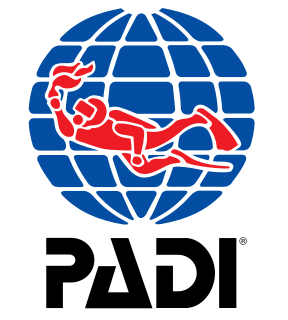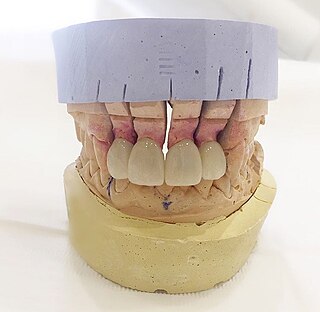Professional certification, trade certification, or professional designation, often called simply certification or qualification, is a designation earned by a person to assure qualification to perform a job or task. Not all certifications that use post-nominal letters are an acknowledgement of educational achievement, or an agency appointed to safeguard the public interest.

The Professional Association of Diving Instructors (PADI) is a recreational diving membership and diver training organization founded in 1966 by John Cronin and Ralph Erickson. Cronin was originally a NAUI instructor who decided to form his own organization with Erickson, and to break diver training down into several modular courses instead of the single universal course then prevalent.

An accountant is a practitioner of accounting or accountancy. Accountants who have demonstrated competency through their professional associations' certification exams are certified to use titles such as Chartered Accountant, Chartered Certified Accountant or Certified Public Accountant, or Registered Public Accountant. Such professionals are granted certain responsibilities by statute, such as the ability to certify an organization's financial statements, and may be held liable for professional misconduct. Non-qualified accountants may be employed by a qualified accountant, or may work independently without statutory privileges and obligations.
In the United States, a health maintenance organization (HMO) is a medical insurance group that provides health services for a fixed annual fee. It is an organization that provides or arranges managed care for health insurance, self-funded health care benefit plans, individuals, and other entities, acting as a liaison with health care providers on a prepaid basis. The Health Maintenance Organization Act of 1973 required employers with 25 or more employees to offer federally certified HMO options if the employer offers traditional healthcare options. Unlike traditional indemnity insurance, an HMO covers care rendered by those doctors and other professionals who have agreed by contract to treat patients in accordance with the HMO's guidelines and restrictions in exchange for a steady stream of customers. HMOs cover emergency care regardless of the health care provider's contracted status.
A dietitian, medical dietitian, or dietician is an expert in identifying and treating disease-related malnutrition and in conducting medical nutrition therapy, for example designing an enteral tube feeding regimen or mitigating the effects of cancer cachexia. Many dietitians work in hospitals and usually see specific patients where a nutritional assessment and intervention has been requested by a doctor or nurse, for example if a patient has lost their ability to swallow or requires artificial nutrition due to intestinal failure. Dietitians are regulated healthcare professionals licensed to assess, diagnose, and treat such problems. In the United Kingdom, dietitian is a 'protected title', meaning identifying yourself as a dietitian without appropriate education and registration is prohibited by law.
A physician assistant or physician associate (PA) is a type of mid-level health care provider. In North America PAs may diagnose illnesses, develop and manage treatment plans, prescribe medications, and may serve as a principal healthcare provider. PAs are required in many states to have a direct agreement with a physician. PAs typically cost the practice employing them less than half as much as a fully qualified physician.
Continuing medical education (CME) refers to a specific form of continuing education (CE) that helps those in the medical field maintain competence and learn about new and developing areas of their field. These activities may take place as live events, written publications, online programs, audio, video, or other electronic media. Content for these programs is developed, reviewed, and delivered by faculty who are experts in their individual clinical areas. Similar to the process used in academic journals, any potentially conflicting financial relationships for faculty members must be both disclosed and resolved in a meaningful way. However, critics complain that drug and device manufacturers often use their financial sponsorship to bias CMEs towards marketing their own products.

The American Osteopathic Association (AOA) is the representative member organization for the more than 168,000 osteopathic medical doctors (D.O.s) and osteopathic medical students in the United States. The AOA is headquartered in Chicago, Illinois, and is involved in post-graduate training for osteopathic physicians. Beginning in 2015, it began accrediting post-graduate education as a committee within the Accreditation Council for Graduate Medical Education, creating a unified accreditation system for all DOs and MDs in the United States. The organization promotes public health, encourages academic scientific research, serves as the primary certifying body for D.O.s overseeing 18 certifying boards, and is the accrediting agency for osteopathic medical schools through its Commission on Osteopathic College Accreditation. As of October 2015, the AOA no longer owns the Healthcare Facilities Accreditation Program (HFAP), which accredited hospitals and other health care facilities.

Project AWARE is a nonprofit organization working with volunteer scuba divers to protect the oceans. Project Aware has offices in UK, US, and Australia, supporting divers acting in their own communities, to implement lasting changes in two core areas: shark conservation and marine litter.
Established in 1933, the American Board of Medical Specialties (ABMS) is a non-profit organization which represent 24 broad areas of specialty medicine. ABMS is the largest physician-led specialty certification organization in the United States.

Rehabilitation counseling is focused on helping people who have disabilities achieve their personal, career, and independent living goals through a counseling process.

Dental laboratories manufacture or customize a variety of products to assist in the provision of oral health care by a licensed dentist. These products include crowns, bridges, dentures and other dental products. Dental lab technicians follow a prescription from a licensed dentist when manufacturing these items, which include prosthetic devices and therapeutic devices. The FDA regulates these products as medical devices and they are therefore subject to FDA's good manufacturing practice ("GMP") and quality system ("QS") requirements. In most cases, however, they are exempt from manufacturer registration requirements. Some of the most common restorations manufactured include crowns, bridges, dentures, and dental implants. Dental implants is one of the most advanced dental technologies in the field of dentistry.
The Canadian Mental Health Association (CMHA) was founded on April 22, 1918, by Dr. Clarence M. Hincks and Clifford W. Beers. Originally named the Canadian National Committee for Mental Hygiene, it is one of the largest and oldest voluntary health organizations operating in Canada.
Board certification is the process by which a physician or other professional demonstrates a mastery of advanced knowledge and skills through written, practical, or simulator-based testing.
The National Healthcareer Association (NHA) is a national professional certification agency for healthcare workers in the United States. Granting credentials in more than 8 allied health specialties, it is an organizational member of the National Organization for Competency Assurance (NOCA). The National Healthcareer Association partners with educational institutions nationwide with over 350,000 certified individuals. It is one of the largest certification and continuing education providers. The National Healthcareer Association works with health training institutions, hospitals, unions, and the US Defense Department through DANTES; it has approved over 2400 training/testing locations throughout the US and in several countries. These institutions offer allied health programs and use the national certification as their "End Of Program Credential." Healthcare professional certification is different from a license such as a Registered Nurse, or a licensed practical nurse. Although certification is not state mandated and/or regulated in all 50 states, most employers and industry organizations prefer their employees to be certified.
The American Society of Human Genetics (ASHG), founded in 1948, is a professional membership organization for specialists in human genetics. As of 2009, the organization had approximately 8,000 members. The Society's members include researchers, academicians, clinicians, laboratory practice professionals, genetic counselors, nurses, and others who have a special interest in the field of human genetics.
National Board of Diving and Hyperbaric Medical Technology (NBDHMT), formally known as the National Association of Diving Technicians, is a non-profit organization devoted to the education and certification of qualified personnel in the fields of diving and hyperbaric medicine.
The Healthcare Facilities Accreditation Program (HFAP) is a not-for-profit organization meant to help healthcare organizations maintain their standards in patient care and comply with regulations and the healthcare environment. Headquartered in Chicago, HFAP is an accreditation organization with authority from Centers for Medicare and Medicaid Services.
Credentialing is the process of establishing the qualifications of licensed medical professionals and assessing their background and legitimacy.
NTCA - The Rural Broadband Association (NTCA) is a membership association with the goal of improving communications services in rural America. With a membership comprising nearly 850 independent rural American telecommunications companies in forty-four states, NTCA provides training and employee benefit packages to its members. It also advocates rural issues to legislatures, including universal service, rural infrastructure, cybersecurity, telemedicine, and consumer protection.





